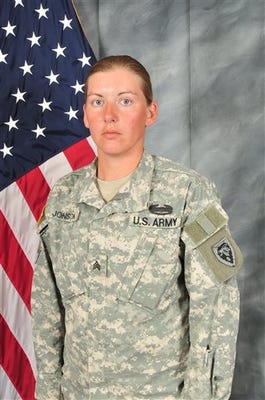source GAIA package: Sx_MilitaryTimes_M6201410305180025_5675.zip Origin key: Sx_MilitaryTimes_M6201410305180025 imported at Fri Jan 8 18:18:16 2016
 The gay widow of a soldier killed in Afghanistan has received word from the Department of Veterans Affairs that she will receive the same full benefits that heterosexual widows and widowers receive.
The gay widow of a soldier killed in Afghanistan has received word from the Department of Veterans Affairs that she will receive the same full benefits that heterosexual widows and widowers receive.
It's even more significant, said Army National Guard Staff Sgt. Tracy Dice Johnson, because the benefits will be retroactive, dating back to her wife's death in October 2012. That was before the Supreme Court's ruling in the summer of 2013 overturning parts of the Defense of Marriage Act.
"My hat's off to the VA," Johnson said. "It was a long, drawn-out process, but at the end of the day, hearts and minds prevailed." Among the benefits are the Dependency and Indemnity Compensation, generally paid to spouses and children and some parents of those who died while on active duty. The rate for DIC in 2014 is $1,233.23 a month; Johnson will receive that retroactively to the date of her wife's death. Johnson, who changed her name legally after her wife died, will also receive medical, education and other benefits.
Johnson's wife, 29-year-old Army National Guard Staff Sgt. Donna Johnson, one of three soldiers killed Oct. 1, 2012, in Afghanistan by a suicide bomber. As far as is known, Dice and Johnson are the first same-sex married military couple to have suffered a casualty after the repeal of "don't ask, don't tell." They married Feb. 14, 2012, before Johnson's deployment in August 2012 to Afghanistan.
Johnson announced the VA's decision May 17 at the inaugural National Gala Dinner of the American Military Partner Association, where she received the organization's 2014 Community Hero Award. Johnson thanked the association for the support she has received, as well as her parents, her mother-in-law Sandra Johnson., "and the love of my life, Donna, who I know is here with us."
Stephen Peters, president of the association, noted it has accomplished much in the last five years since partners of gay service members began coalescing into a support group.
"Tonight is about recognizing you for your sacrifices and your service," Peters told the group of more than 300 people packed into the Liaison Hotel in Washington, D.C. He said these service members and their spouses "are some of the most loyal, committed, dedicated and resilient patriots we have."
For years, he said, military partners threatened the careers of their service members under the former "don't ask, don't tell" policy. Spouses picked up and moved from one duty station to another every few years, living in isolation, while lacking access to military medical benefits, family readiness programs, housing allowances "and a host of benefits that make the sacrifices of military life more bearable."
There still are challenges, such as lack of access to in-state tution for spouses, and burdens for gay couples who want to adopt. "It's clear we have a long journey ahead of us, but it's also clear we've come a very long way," said Peters.
"One thing I know for sure, that the voices of our military spouses are powerful. We'll continue to use those voices in respectful, engaging and compelling ways, building bridges for positive changes for our families."
Rosemary Williams, deputy assistant secretary of defense for military community and family policy, praised the group for their work.
"History will record your action and its significance for all time," said Williams, also noting that the group's input helped guide the Defense Department in implementing the changes that allowing benefits for same-sex couples in the military.
DoD officials know that the readiness of the military is bolstered by the strength of families, Williams said, and outlined some of the benefits available to all spouses, encouraging them to use them.
"Now we can say to our military spouses and partners: Welcome aboard," said Williams.
